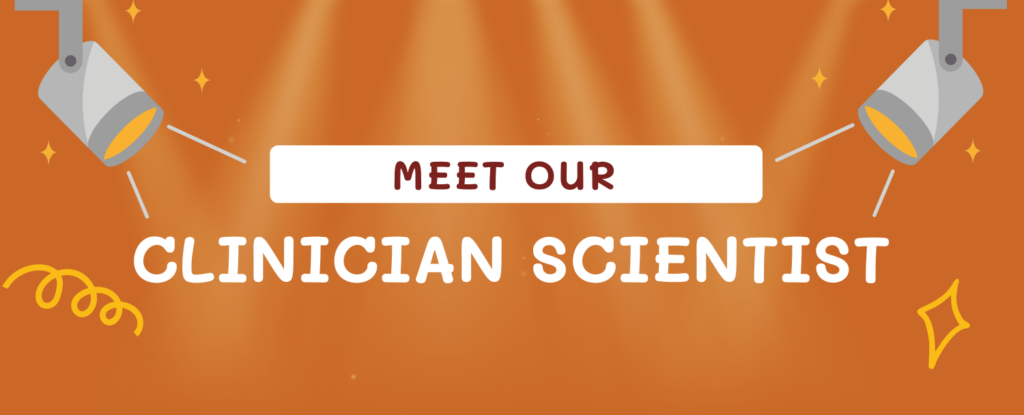
CS Spotlight
Initiated in October 2022, the Clinician Scientist Academy seeks to feature our very own clinician scientists, where they share their research journeys and some interesting/lesser known facts about themselves. Click on to read more about what they have to share.
Dr Bernice Oh Lingzhi
Consultant, Division of Paediatric Haematology-Oncology, Department of Paediatrics, National University Hospital
MBBS, MMed, MCI
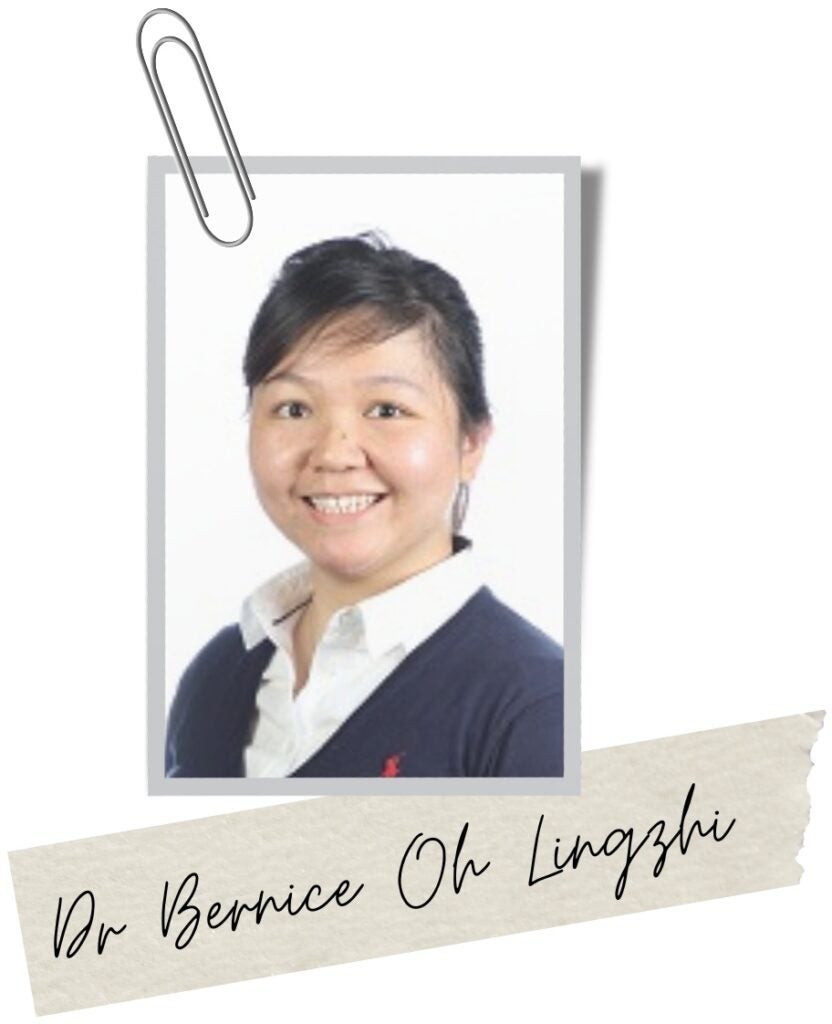
What is your research area?
My research focus is on the development of new cellular therapies for both children and adults with cancer. Working alongside Prof Dario Campana and Prof Allen Yeoh, our team engineers CAR-T cells – essentially taking a patient’s own immune cells and reprogramming them to better recognize and destroy cancer cells.
As the director of the cell processing unit in NUS, I also lead a team of cell engineers who manufacture CAR-T cells for first-in-human studies and ongoing early phase CAR-T cell therapy clinical trials. It is in this field of translational research where you can see your work directly impact patient care, bridging the gap between scientific discovery and clinical treatment.
What inspired you to choose your research area? Was there a defining moment?
It is the third year of paediatric residency, I am doing 7 calls a month and I am having a particularly bad week of back-to-back calls to cover for a sick colleague. My arms are aching post call from carrying around a thick set of seniors notes for my upcoming M.Med examination. I didn’t have the time to study them the way I wanted to, but I feel better just carrying them around. Just as I am about to doze off post call, I receive a seemingly random email that simply read:
“Are you willing to sell your soul for $15k?”
It was from my mentor Prof Allen Yeoh, my tutor in medical school who inspired me to pursue a career in paediatrics. He had almost become a stranger after 4 years of being told to “focus on your clinical training” right out of medical school.
Something strange within nudged me to make a deal with this “devil” that afternoon for $15k and I have not looked back since.
Winning my first junior CS grant (albeit only $15k) was that refreshing jumpstart that I needed, I had a renewed sense of purpose as a young doctor, that perhaps I could be something more than a cog in the machine of clinical care. Prof Allen sat down with me and went through my presentations, from intentional pauses in speech to the choice of fonts on slides, I was mentored personally. I was allowed to ask questions freely and to explore my research interests, but if I wandered too far off track, I could always trust my mentor to pull me back before I fell off completely.
Prof Allen has shaped my research career by creating the opportunity for me to be trained by Prof Dario Campana in the field of cell therapy, opening doors for me to collaborate with others as a junior CS-in-training. More importantly, Prof Allen has led by example, to have the tenacity to push the boundaries for patients, to challenge norms with science, and to always try to give our patients a fighting chance. Prof Allen always reminds me that clinician-scientists are clinicians first, that we do research for our patients. It is with this vision that we have gone on as a team to focus on translational research that is truly transformative, from first-in-human studies to early phase clinical trials that have saved lives and made a positive impact in the field.
What are some of the challenges of being a CS? How do you work to overcome that?
If you’re considering the clinician-scientist path, let me be honest about what you’re signing up for. You’ll discover that being a skilled physician doesn’t automatically make you a good researcher – the skill sets are surprisingly different. When I entered the lab after completing my clinical training, it felt like being a medical student again, fumbling through basic techniques that other PhD students had mastered years earlier. As clinicians, we’re trained to make quick decisions and move efficiently through tasks, but lab work requires meticulous attention to every single step in lengthy protocols. I can’t count how many experiments I ruined in those early days by unconsciously skipping what seemed like minor steps or rushing through procedures. The learning curve was steep and honestly pretty humbling – imagine going from confidently managing patients to pipetting incorrectly and contaminating cell cultures. But here’s the thing: that same determination that got you through residency will serve you well in research. All those failed experiments become valuable practice, and eventually you’ll find yourself troubleshooting for others and feeling genuinely confident at the bench. The transition is challenging, but it’s absolutely doable with patience and persistence.
What is your advice for fellow residents who are sitting on the fence and undecided still about being a CS?
You know that incredible rush when you nail a difficult diagnosis or watch a patient walk out of the hospital completely cured? That’s what keeps us all going in those brutal residency years. But you’ll also face those heartbreaking moments when despite your best efforts, you lose patients you’ve genuinely cared about. I remember feeling this overwhelming sense of helplessness, knowing that if I stayed purely in clinical practice, I’d keep encountering the same devastating diseases with the same limited treatment options.
That’s when I realized I had a choice. I could accept that some battles can’t be won with current medicine, or I could try to change the game entirely. Research isn’t just about publishing papers – it’s about creating the treatments that future residents will use to save the patients we’re losing today. Yes, the clinician-scientist path is demanding and uncertain. You might spend years on projects that don’t pan out, and there’s no guarantee your work will lead to breakthroughs. But think about it this way: every major advance in medicine started with someone who decided to stop accepting “that’s just how it is.” You might be the one to develop the therapy that changes everything for a particular disease. Even if you’re not, you’ll be contributing to progress that builds toward that breakthrough. The only way to guarantee you won’t make a difference is by never trying.
Asst. Prof Zhong Youjia
Associate Consultant, Khoo Teck Puat – National University Children’s Medical Institute, National University Hospital
Assistant Professor, Yong Loo Lin School of Medicine, National University of Singapore
MBChB (Hons), MRCPCH (UK), MMed (Paediatrics), MCI, FAMS (Paediatrics and Child Health), PhD

What is your research area?
Paediatric Vaccinology
Our research has identified the correlate of protection against symptomatic SARS-CoV-2 infection in children; T cell responses are the most important predictor for protection against prospective infections in children. From this important fundamental principle, we were able to infer that 1) healthy children do not need booster vaccinations after the initial vaccination regime against COVID-19, and that 2) immunocompromised children need 3 doses as primary vaccination regime, and boosters 6-12 monthly thereafter.
Share tips for mentoring.
Be open to learning from mentees, as mentoring is a two-way thoroughfare week just to stay afloat.
What one piece of advice would you have given yourself 10 years ago?
“Life is not a series of planned events” – this is a direct quote from Bishop Rennis Ponniah, and applies to many areas of life. Knowing this, one can take purported “failures” as opportunities rather than adversity.
Prof Ronald Lee Chi-Hang
Senior Consultant, Department of Cardiology, National University Heart Centre, Singapore
Senior Consultant, Sleep Physician, Alexandra Hospital, Singapore
Professor, Yong Loo Lin School of Medicine, National University of Singapore
MBBS, MD, FRCP (Edin), FAMS, FACC, FSCAI

What is your research area?
Unmasking the Bidirectional Cross-Talk Between Obstructive Sleep Apnea and Cardiometabolic Multimorbidity in Ageing Asians
Share a memorable/impactful contribution you have done for research in Singapore.
I have yet to make a significant impact on the Singapore research ecosystem. However, I led a team of cardiologists, sleep physicians, and dentists to successfully complete the CRESCENT trial. The trial was selected for presentation at the Late-Breaking Clinical Trial session of the American College of Cardiology. The full manuscript was simultaneously published in the Journal of the American College of Cardiology (JACC). My PhD student and I, as mentor, were honored with the William W. Parmley Young Author Achievement Award from the American College of Cardiology for that publication.
As a mentor, share a key lesson you have learnt.
Individuals pursue a PhD for different reasons. I’ve had students who were hardworking, motivated, and intelligent. On the other hand, I’ve also had a student who showed no interest in research and ultimately did not complete the PhD. This experience taught me that motivation and genuine interest in research are just as important as ability.
What one piece of advice would you have given yourself 10 years ago?
I would tell myself to take long vacations and enjoy the world while I could. Once you enter the competitive world of research, you’ll find yourself working seven days a week just to stay afloat.
Dr Goh Lay Hoon
Senior Consultant, Department of Family Medicine, National University Health System, National University Polyclinics
Assistant Professor, Division of Family Medicine, Yong Loo Lin School of Medicine, National University of Singapore
MBBS (S’pore), MMed (Fam Med)(S’pore), FAMS, MClin Epid (AUS), PhD (NUS)

What is your research area? What prompted you to be a clinician-scientist (CS)?
My research area is in health services for people with chronic diseases in primary care. For my PhD, I evaluated how our private general practitioners (GPs) in the Primary Care Networks deliver care to patients with type 2 diabetes as guided by the Chronic Care Model, a patient-centred framework. With Healthier SG initiatives and as Singapore ages with more people having chronic conditions, it is timely to better understand how our GP colleagues manage chronic patients.
Currently, I am working on a project that examines patients’ concordance to chronic disease management guidelines in National University Polyclinics (NUP) using routinely collected patient data. We plan to develop a patient risk prediction scoring system for poor biochemical outcomes e.g., glycated hemoglobin levels and renal function.
Professor Doris Young, my previous head of department encouraged me to take up the PhD, as there weren’t many CS from Family Medicine. Through the sharing of my experience, I hope to inspire more family physicians to embark on doing research and completing a PhD.
I have always wanted to do research in an area that would help doctors do their work more effectively and efficiently and to improve patient care. By understanding and targeting the barriers to care provision, we can improve care for our patients as well as improve work processes for our colleagues.
What are some of the challenges of being a CS? How do you work to overcome that?
When I first started, there weren’t many CS doing health services research, but I had a few Family Medicine friends from other clusters who were also doing their PhDs, so we formed a support group. Now there are more researchers in NUHS who are doing health services research, so there’s opportunity to collaborate and discuss issues common to us.
What is one piece of practical advice you would give to someone new entering this field?
Plan your schedules such that you have time to unwind and do other things such as keeping up with a hobby or spending time with family and friends. Work can consume lots of our time, so it’s important to keep a healthy balance between work and me-time.
Dr Stephanie Ko Qianwen
Consultant, Division of Advanced Internal Medicine, Department of Medicine, National University Hospital
MBBS (UK), M Med (Int Med), MPH (US)
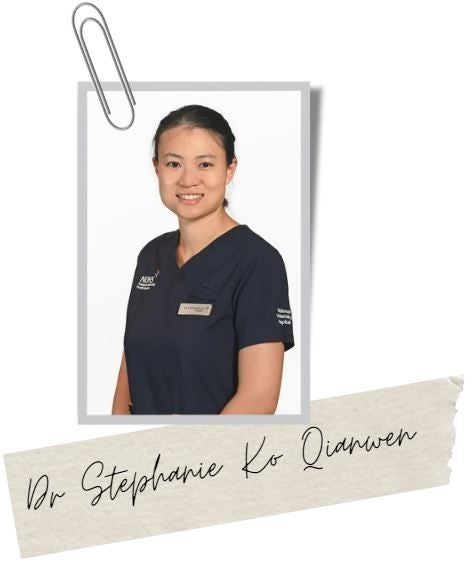
What inspired you to choose your research area? Was there a defining moment?
I originally wanted to do medicine because I was interested in helping people, but as I continued in my training I started getting interested in the systems in which we practice. Health services and implementation research was a natural fit. When I started developing the hospital-at-home service for NUHS, I wanted to ensure that the change was impactful – to ensure that we rigorously measure what we’re doing to ensure we’re not just doing things differently, but we’re doing them right. I currently lead a research team that evaluates all aspects of hospital-at-home, from patient/caregiver/staff experiences, clinical and cost effectiveness and scale up studies.
Could you describe one of your workdays? What is the most gratifying part of being a CS?
A typical day is balancing between clinical duties, leading the NUHS@Home to scale up and driving the research team. I’ve had to learn to block out specific times for deep work – uninterrupted periods where I can focus on data analysis, grant or manuscript writing, or planning new studies. The most gratifying part is seeing our research translate into actual change in policy and practice, for example when the work that my team has published contribute to a policy shift to mainstream hospital-at-home in Singapore this year.
What helped you get to where you are, and what advice would you give someone?
Everyone’s journey is different! If you’re a clinician and interested in improving the way we deliver healthcare, find me for a chat! I may not have the right answers but could point you in the right direction.
Dr Nicholas Syn Li-Xun
Dean’s Fellow, Yong Loo Lin School of Medicine, National University Singapore
MBBS (S’Pore)
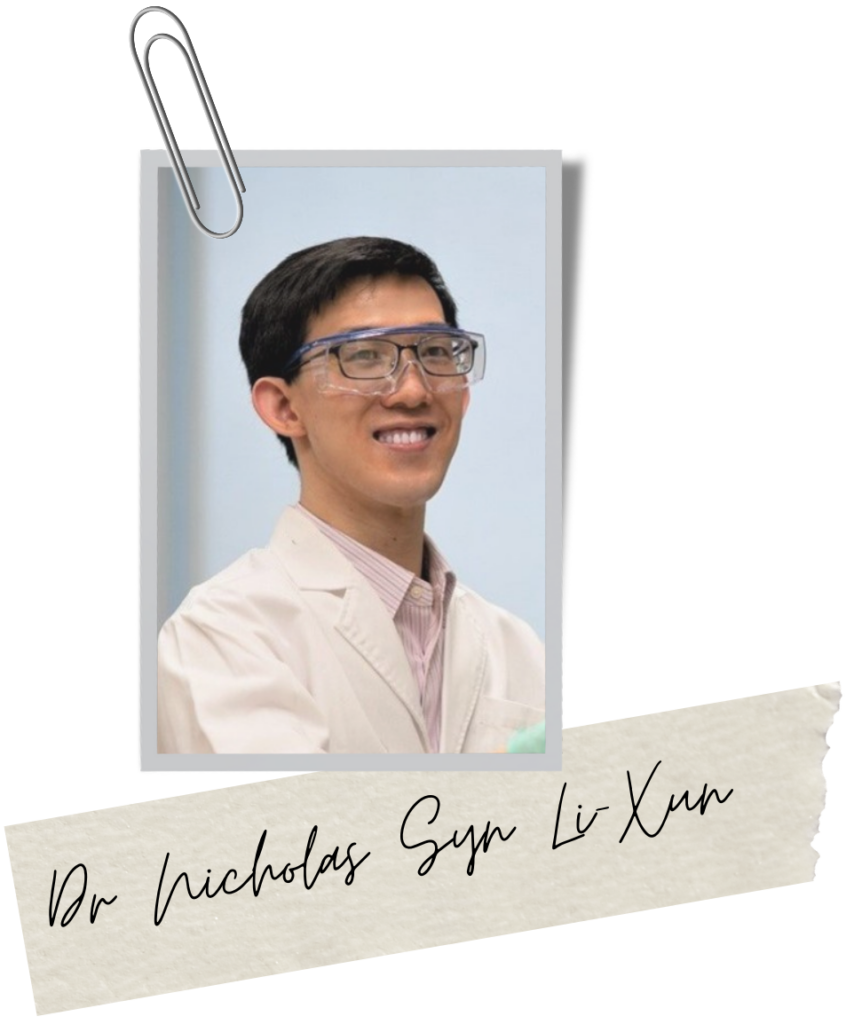
How did you get into your research area?
I started out doing research at a stem cell stage even before I got into medical school. Invariably, over the length of medical school where one is exposed to various specialties, I met different mentors and encountered various clinical unmet needs that led me to explore research in multiple specialties. This might be slightly different from the majority of clinician-scientists who chose their clinical specialty before deciding to embark on research.
Fortunately, after some detours, I think I have finally settled in the area of personalized medicine in metabolic and liver diseases. Interestingly, this study area has roots in my very initial exposure to research, as I started my research training doing pharmacogenetics and precision oncology with my longest mentor, Prof Goh Boon Cher, in 2014. One of Prof Goh’s collaborators, A/Prof Richie Soong, with whom I spent nearly 2 years in his lab, was another influential figure in my research journey who helped me appreciate the technical intricacies of molecular pathology and advanced bioinformatics.
Could you describe one of your typical workdays? What are some of the challenges of being a CS? How do you work to overcome that?
Admin… Bureaucracy… Red tape… Admittedly, these are strong disincentives to doing research. Protected time helps. Pro tip: hire a good admin from the get-go.
What has helped you get to where you are, and what advice would you give someone who wants to come in this direction?
Mentorship is the most crucial aspect. I would not have gotten to where I am now if I did not have a strong foundation. And this was enabled by Prof Goh Boon Cher sending me to his multiple collaborators to learn different skillsets, which opened up other doors in the process—from Prof Richie Soong, to Tai Bee Choo, Liam Brunham, Marie Loh, Wang Lingzhi and others. A good mentor genuinely wants you to grow to become an independent researcher, and they are selfless and never insecure, not wanting to “retain” you in order to benefit themselves; these are some characteristics you would want to do some homework about before approaching a mentor for the first time.
The topic of characteristics of a good mentor was discussed at the last CS Bootcamp, in fact. Interestingly, “replying fast” was flagged as a key trait, and I would not disagree (although to be honest, most of my research mentors including Prof Goh have been terribly slow at replying (: A few exceptions being Prof Chong YS and Prof Koh WP, whom I consider more as life mentors, whose replies are speedy!). But over the years, especially as I have not infrequently played the role of matchmaker—pairing juniors who want to get started in doing research with clinician researchers—I can vouch there is indeed a good correlation between students’ success and how responsive their mentors are!
Dr Dedrick Chan Kok Hong
Consultant, Division of Colorectal Surgery, Department of Surgery, National University Hospital
Consultant, Division of Surgical Oncology, National University Cancer Institute, Singapore
Consultant, Division of Surgical Oncology, Department of Surgery, Alexandra Hospital
MBBS, MMed (Surgery), MCI, FRCS (Eng)
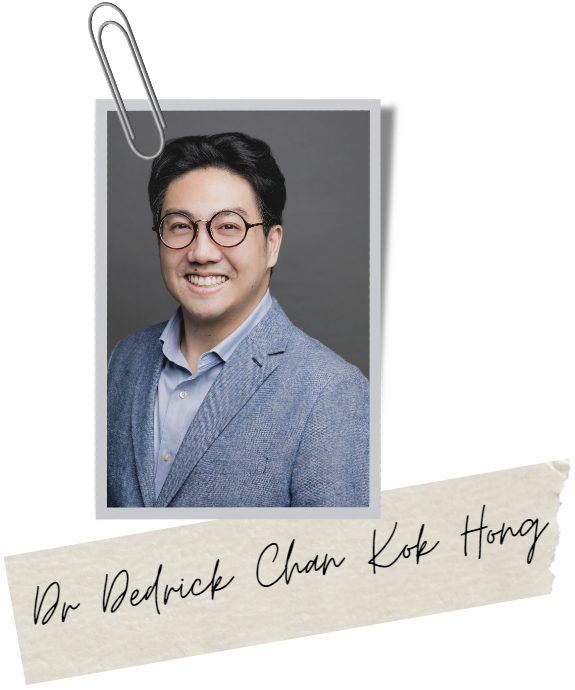
What is it about research that you like?
For me, research satisfies a fundamental and innate desire to uncover Truth. Specific to my work, it is to understand why cancer arises, and what incites a cell to take its earliest, infant stages into malignancy. What I enjoy most about scientific research is its inherently creative process. Once a scientific question is identified, there are many ways to go about answering it. Choosing the most appropriate way is as much a function of knowledge and experience as it is an Art. Hence, overstepping the limitations of time and money is as disadvantageous as choosing a simplified path which is over-reliant on assumptions or outdated information. Being able to design elegant experiments which bring me closer to discovering Truth is something I find highly satisfying.
I also feel that research is the melodic contrapuntal to Medicine. In surgery, we seek to reduce excessive novelty in clinical practice. Too much and persistent novelty suggests either inexperience or overstepping one’s technical boundaries. In contrast, research maximises novelty, and experiments which yield surprising and unexpected results are the most exciting.
Could you describe one of your typical workdays?
It’s difficult to have a settled rhythm. It’s critical to be flexible because there will be times when research is a bit more intense due to time-sensitive experiments, and other times when the demands of clinical work must take precedence.
As a colorectal surgeon, I usually start with ward rounds. Some clinical duties tend to be fixed, such as clinic and endoscopy sessions, so these are predictable and experiments can be planned around them. On days when I have elective surgery, I never do experiments before as I prefer to be focused on the operation. Emergency surgery obviously takes priority over any research work, and if I had originally planned an experiment which is time-sensitive, then I may have to decide between abandoning and restarting the experiment, which is highly unpalatable, or staying back after surgery. Long days are an inevitability. I try to do the planning and thinking of experiments, and the research administration at home. Wash, rinse, and repeat.
What are some of the challenges of being a CS?
It’s a journey which can feel quite lonely at times. Clinician-scientists are, necessarily so, rare. And while there are commonalities, each clinician-scientist is quite different from the next one. This translates into a journey which is often unique to the circumstances of that individual. It can be just as difficult for colleagues to understand why pulling off a difficult experiment is highly satisfying, as it is perplexing for them to fathom how experiments can keep failing repeatedly.
The work itself can also feel isolating. Being in the laboratory during unsociable hours and days all alone can feel depressing.
How do you work to overcome that?
Having a strong sense of purpose in the research which I do, and being very clear about the outcomes which really matter to me have been very important. Setting out as a clinician-scientist with these reasons in mind serve as a compass when the going gets tough. It has helped me to reorientate and refocus when results do not go as expected, or when progress is especially slow, both in terms of clinical as well as research growth and development.
What has helped you get to where you are, and what advice would you give someone who wants to come in this direction?
People and relationships have been very important. As I alluded to earlier, they may not always understand the specific challenges or the technical complications, but having a core group of individuals to support you is a soothing balm for difficult moments. At work, I can count on the camaraderie and team spirit of my fellow Consultants and Head of Division, and at home, I have my wife and daughter to lend a listening ear to my complaints. Surrounding yourself with people who are supportive and not discouraging is essential. Frankly, the scientific world is an especially brutal one, and naysayers abound at every corner, so having this core group to cheer you on makes a huge difference psychologically.
Dr Daniel Huang Qingyao
Consultant, Division of Gastroenterology & Hepatology, Department of Medicine, National University Hospital
Consultant, Adult Liver Transplantation Programme, National University Centre for Organ Transplantation, National University Hospital
Assistant Professor, Department of Medicine, Yong Loo Lin School of Medicine, National University Singapore
MBBS (S’pore), MMed (Int Med)(S’pore), MRCP (UK)
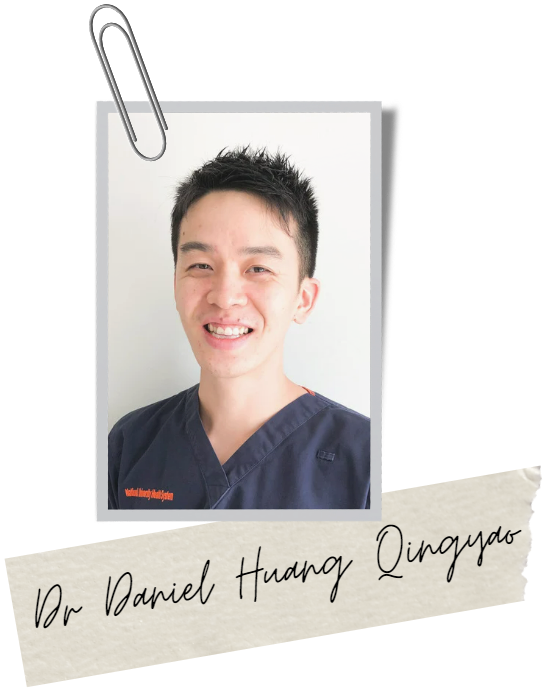
What is your research area? What prompted you to be a clinician-scientist (CS)?
I work on the early detection and prevention of hepatocellular carcinoma in the setting of non-alcoholic fatty liver disease and viral hepatitis. I am looking at non-invasive strategies to risk stratify and detect chronic liver disease and hepatocellular carcinoma by leveraging advanced imaging- and RNA-based methods.
I see many patients in my clinic who are in “evidence-free zones”. My hope is that I can help to fill in some of these gaps in knowledge and help a larger group of patients, beyond those in my clinics.
How do you manage your time to do research in the midst of heavy clinical workload?
My clinical training taught my how to multitask! I try to find pockets of time between clinics or endoscopy sessions to write manuscripts. However, lab work is harder to balance and requires planning and scheduling far in advance.
What one piece of advice would you have given yourself 10 years ago?
It is a long process, but it is about enjoying the journey, rather than just the outcomes!
Dr Vanda Ho Wen Teng
Associate Consultant, Division of Geriatric Medicine, Department of Medicine, National University Hospital
MB BChir(Cambs), MRCP(UK), FAMS
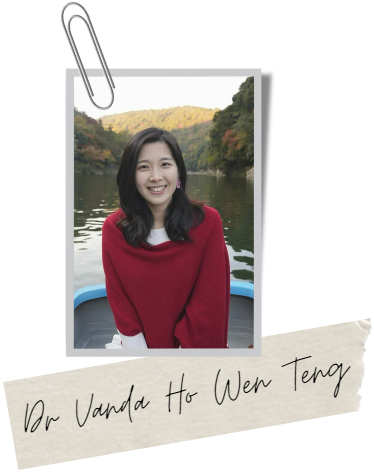
What is your research area?
My research area is in immunosenescence, the ageing immunity. My current project investigates the impact of age on the magnitude and durability of vaccination effects on the immune system. Leveraging on the national COVID-19 mRNA vaccine roll out as a common stimulus experienced by both younger and older adults at the same timepoint, this has allowed me to examine the downstream effects on the adaptive immune system. I plan to expand into looking at geriatric syndromes and their relationship to immunosenescence.
What prompted you to be a clinician-scientist (CS)?
I do not consider myself one yet… I still have ways to go!
While training to be a geriatrician, it became rapidly clear to me how little evidence-based medicine is being practised with older people. Most of the guidelines we follow have been extrapolated from trials on younger adults. Case in point, the COVID-19 mRNA vaccine was tested mainly on younger adults before an international roll out which prioritised vaccinating older adults. To me, care for older adults cannot progress if we leave this gap unaddressed, and I strongly believe we should have research on older adults for older adults. I still lack the key substrates to do good research and at times have been disheartened by the arduous process of gaining these skills, but I am fortunate to have met many inspirational mentors during my journey who provided me with opportunities, support and most importantly, a mould to embody what it is like to be a clinician scientist. They are reason I am where I am now!
What inspired you to choose your research area? Was there a defining moment?
I stumbled into my research area of immunosenescence by a combination of timing, meeting the right people and opportunities. This was right when the first COVID-19 cases were being reported, and the urgent worry was that older adults would be bearing the brunt of the pandemic. Even prior to COVID-19, we saw many older adults come into hospital for their first serious infection and unfortunately head downhill from that point. From a simplistic perspective, if we can alter this sentinel event, be it preventing it from happening, reducing its severity or hastening the recovery process, the possibility arises to avoid the subsequent functional decline in older adults. As I learnt more about immunosenescence, I realised how far-reaching the effects of perturbations in the immune system can be. It is therefore unsurprisingly it can affect key geriatric syndromes like frailty, sarcopenia and cognitive impairment. This to me makes immunosenescence so important to be studied!
Could you describe one of your typical workdays?
I am currently on maternity leave so my day consists of 2 to 3 hourly tranches of breastfeeding, changing diapers and putting baby to sleep! Of course, research never stops so whilst on maternity leave, study visits and sample collection do continue. I am fortunate and grateful to have an understanding team who help me fill in the gaps while I am away, and thankfully do not mind when my texts in the wee hours of the morning. Inspiration sometimes strikes then!
What new superpowers would you like to develop?
To be a human ChatGPT! At conferences and funding pitches, I am always impressed by the astute questions senior researchers have. Being able to hear how they think, see how quickly they can grasp the heart and crux of the matter and converse in basic science. To absorb, internalize and apply new knowledge quickly, relevantly, and succinctly are superpowers I very much hope to be able to develop!
What is one piece of practical advice you would give to someone new entering this field?
Keeping faith that life and its journey will take you down the road where opportunities will open when you least expect it. I can assure you that you will have many moments where you hit the roadblock and everything is going everywhere and nowhere all at once. What if I am not good enough? Is this even the right path to go down? Is there any significance in what I am trying to accomplish? Then your mind opens up a new perspective after a fortuitous meeting with someone you least expect, and your mind clears up and you forge a new way forward. I do realise now that research has so many facets, and if one does not work, there are so many more perspectives to explore. Also, everyone experiences research in a different manner, so I feel until I try it out for myself, I would never know!
Name one thing you are not very good at?
I am terrible at cooking, mediocre at baking, but I love watching Instagram videos of them and daydream about all the amazing meals I can (potentially) whip up. Even more so now as I am preparing to cook for my little one! The best thing is that he knows no better.
Dr Amanda Chan Chee Yun
Senior Consultant, Division of Neurology, Department of Medicine, National University Hospital
Senior Consultant, Division of Neurology, Department of Medicine, Ng Teng Fong Hospital
Assistant Professor, Yong Loo Lin School of Medicine, National University of Singapore
MBBS(Hong Kong), MRCP(UK), FRCP(Edin), MMed(Sleep Medicine)(Sydney)
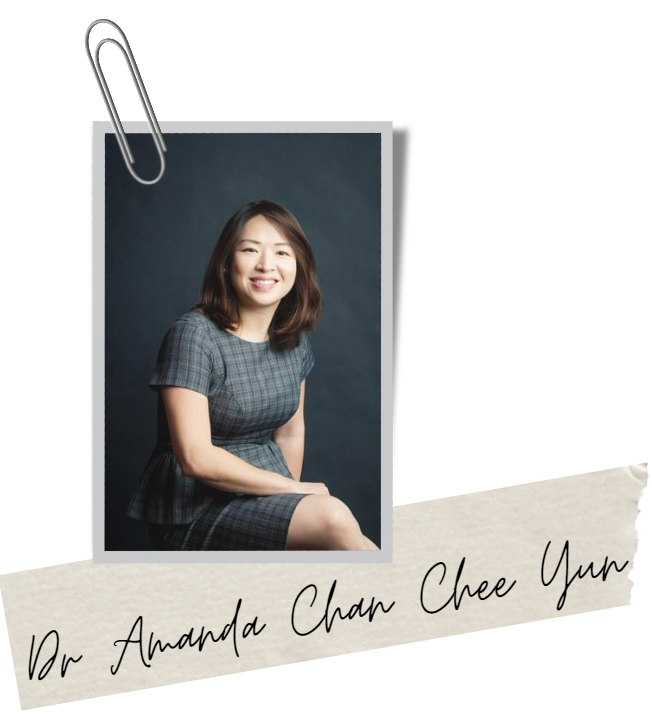
What is your research area? What prompted you to be a clinician-scientist (CS)?
My research area is in deciphering the pathophysiological mechanisms of small fiber neuropathy (SFN), with a focus on immunology. When I was in medical school, I remember the older generation of doctors saying that there is no cure for neurological disorders. Many years later, when I completed my neurology training, I realised that there was a cure for stroke – intravenous thrombolysis. A few more years later, researchers came up with a better cure – thrombectomy. It was then that I realised that although there are many unknowns in neurological disorders, there is huge potential for research, and in doing so, we can help our patients tremendously.
What inspired you to choose your research area? Was there a defining moment?
I wasn’t trained as a researcher in Hong Kong, where I completed my subspecialty training, so research seemed far from reach. But when I came to NUH, I came across a unique group of patients with SFN who had debilitating symptoms, with no answers, and every time they came for follow-up appointments, I felt helpless telling them that there were no new developments. A highly respected professor once told me that it doesn’t take genius with ground-breaking ideas to be a researcher, but rather a little engine that pushes ahead with its ideas and persists despite setbacks that makes a researcher. It was then that I decided to try to find some answers for my patients.
Could you describe one of your typical workdays?
I try to reserve some days of the week purely for research and experiments, while others would be purely for clinical duties. Of course this separation is oftentimes breached, and on bad days I may need to run back and forth between lab and hospital 4-5 times a day! Luckily they’re next to each other.
What are some of the challenges of being a CS? How do you work to overcome that?
The thought processes of a clinician and a scientist are very different – clinicians approach diseases from a top down approach – diagnosing by pattern recognition and trying to solve the problem from a top down approach, while basic scientists approach diseases from a bottom up approach – trying to find the pathophysiological mechanisms and how they cause diseases. The biggest challenge for me is how to bridge that gap. I’m still trying to overcome it by keeping an open mind, thinking out of the box, being flexible, and continuously telling myself that it’s never too late to learn something new.
What are you planning to do after your PhD / Fellowship?
I hope I will be able to set up my own lab, and expand research to other neuroimmunological diseases. If we can find targeted treatments, I envision running large scale clinical trials, with international collaborations.
What one piece of advice would you have given yourself 10 years ago?
Don’t let others define you. Don’t let the past define you. You define yourself and shape your own future.
What is your motto?
There’s no such thing as being too old or too late to learn something new!
What is your research area? What prompted you to be a clinician-scientist (CS)?
My research area is in deciphering the pathophysiological mechanisms of small fiber neuropathy (SFN), with a focus on immunology. When I was in medical school, I remember the older generation of doctors saying that there is no cure for neurological disorders. Many years later, when I completed my neurology training, I realised that there was a cure for stroke – intravenous thrombolysis. A few more years later, researchers came up with a better cure – thrombectomy. It was then that I realised that although there are many unknowns in neurological disorders, there is huge potential for research, and in doing so, we can help our patients tremendously.
What inspired you to choose your research area? Was there a defining moment?
I wasn’t trained as a researcher in Hong Kong, where I completed my subspecialty training, so research seemed far from reach. But when I came to NUH, I came across a unique group of patients with SFN who had debilitating symptoms, with no answers, and every time they came for follow-up appointments, I felt helpless telling them that there were no new developments. A highly respected professor once told me that it doesn’t take genius with ground-breaking ideas to be a researcher, but rather a little engine that pushes ahead with its ideas and persists despite setbacks that makes a researcher. It was then that I decided to try to find some answers for my patients.
Could you describe one of your typical workdays?
I try to reserve some days of the week purely for research and experiments, while others would be purely for clinical duties. Of course this separation is oftentimes breached, and on bad days I may need to run back and forth between lab and hospital 4-5 times a day! Luckily they’re next to each other.
What are some of the challenges of being a CS? How do you work to overcome that?
The thought processes of a clinician and a scientist are very different – clinicians approach diseases from a top down approach – diagnosing by pattern recognition and trying to solve the problem from a top down approach, while basic scientists approach diseases from a bottom up approach – trying to find the pathophysiological mechanisms and how they cause diseases. The biggest challenge for me is how to bridge that gap. I’m still trying to overcome it by keeping an open mind, thinking out of the box, being flexible, and continuously telling myself that it’s never too late to learn something new.
What are you planning to do after your PhD / Fellowship?
I hope I will be able to set up my own lab, and expand research to other neuroimmunological diseases. If we can find targeted treatments, I envision running large scale clinical trials, with international collaborations.
What one piece of advice would you have given yourself 10 years ago?
Don’t let others define you. Don’t let the past define you. You define yourself and shape your own future.
What is your motto?
There’s no such thing as being too old or too late to learn something new!
Dr Ellie Choi Ci En
Associate Consultant, Division of Dermatology, Department of Medicine, National University Hospital
MRCP(UK), MMed(S’pore), MBBS(S’pore)
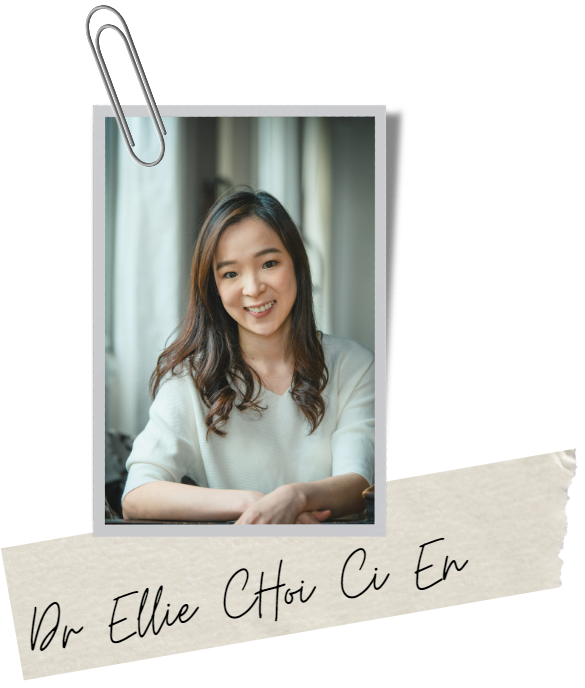
What is your research area?
My research is in understanding the discordance between patients and physicians. Why are some patients so symptomatic despite limited objective disease while others unperturbed when covered head to toe in rashes? Why are we bad at guessing what our patients think?
What prompted you to be a clinician-scientist (CS)?
Wow, I don’t know if I can even be called a clinician-scientist. This feels like a promotion.
Through schooling years, I first dabbled, then later dedicated much time to research. The slew of grant applications naturally followed (some fortuitously successful, many not). Most research cannot progress without some funding, besides, who can say no to prospects of more research money and time?
What inspired you to choose your research area? Was there a defining moment?/ Share a turning point or defining moment in your work?
Some dermatology patients can be quite…. tricky….. How can someone go on for 30mins about a small patch of rash??? Questions like these, borne out of curiosity and frustration, got me started in this area.
The excitement and satisfaction of working on a problem so real to me was out of the world. It still fuels me today. I’m also thankful to my mentors (past and present) for continuing to support me when my ideas no longer matched theirs.
What are the biggest misconceptions about research?
I have peers and juniors telling me, “I don’t like research, its not for me”.
I think it’s a half-faulty statement, akin to someone saying ‘I don’t like to teach’ when they actually mean “I don’t like to teach self-entitled medical students on this boring topic”.
There are elements of research most dislike; laborious mining of clinical records, exasperating statistic struggles, back-and-forth administrative emails, and poorly developed or uninteresting research questions that spark no joy. There is unlikely a researcher left untouched without these battle scars; yet I don’t think all research needs to be like this and it’s something I try to save my team and self from.
What is the superpower (skills and techniques) you are most pleased with? What new superpowers would you like to develop?
I used to be quite pleased with the multiple hobbies I could accommodate in my life, and take pride with each achievement I amassed. In the last year, the concepts of essentialism and minimalism reached out to me. I’m slowly understanding why “less but better” makes for higher contribution, and why productivity does not equate to doing the most number of things in a day.
What is your advice for fellow residents who are sitting on the fence and undecided still about being a CS?
CS or not, find something that interests and motivates you. Don’t take things at face value, or be tempted by paths that are easily available.
Also, don’t compare yourself to others. I struggled with fears of “lagging behind” and how I would match up against others. Would I ever “make it” as a CS? But truly, everyone is walking their own unique path and journey, and regardless of the speed, we are all heading toward a common goal. It’s a dangerous slope to see one’s peers as competitors.
Tell us something no one knows about you.
I was a certified lifeguard for a couple of years! However, apart from retrieving mannequins from the pool bed or throwing some lifebuoys, I never had to rescue a drowning person. Now, I’m probably the one at risk of drowning.
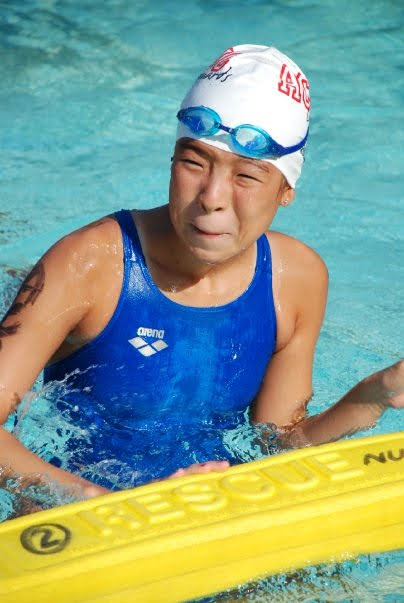
A/Prof Christopher Chen Li-Hsian
Director, Memory Aging and Cognition Centre, National University Health System
Associate Professor, Department of Pharmacology, Yong Loo Lin School of Medicine, National University of Singapore
Visiting Senior Consultant, Department of Psychological Medicine, National University Hospital
BA(Hons)(UK), BMBCh(UK), MRCP(UK), FAMS(Neurology), FRCPE(UK)
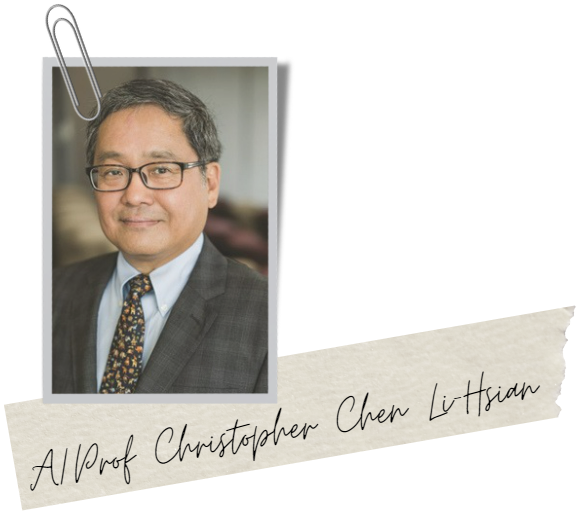
What is your research area?
My major research and clinical interests are in neuroimaging, molecular biology and treatment of stroke and dementia.
What prompted you to be a clinician-scientist (CS)?
The realisation that I needed protected time and resources to make a real contribution to science. I returned to Singapore after training in the UK back in 1996 and over the next decade only managed to publish about 40 papers with a laboratory and clinical trials team. I recognised that my peers internationally had more time to commit to academic medicine and that I could only be competitive and productive if I could join the CS track. It was not a seamless transition but in the decade from 2006 – 2015 my research output quadrupled to 180 papers and hopefully this trend is improving as with only 2/3rds of my second decade as a CS passed, our team already has over 200 papers published
Share a turning point or defining moment in your work?
Whilst there are many stories of serendipitous discoveries, most advances require both good fortune as well as insight since as Louis Pasteur observed, “chance favours only the prepared mind”. Indeed, the opportunities granted by chance may fall upon fallow ground without training, dedication and experience, including that of failure.
A defining moment in my work came during a conference when I heard about a novel means of identifying microinfarcts on MRI. It had previously been shown by neuropathologists that such small lesions were the main correlates of vascular dementia but it had not been possible to identify them ante-mortem using MRI despite various attempts by our group and others. Quickly realising the opportunity, I arranged for a visit to Singapore, exchange of staff and this led quickly to several important discoveries, papers, grants and more importantly, enduring friendships and collaborations on this novel biomarker and other projects. I can only reflect on the subtle interplay of these factors my scientific career and am glad to be able to make a contribution to science whilst enjoying what I do.
What are the biggest misconceptions about your work?
That academic work rarely translates to clinical benefits. Whilst progress may be fitful and slow, really making a difference in clinical practice and bringing hope to patients and their families takes a steady and constant partnership between academia, industry and healthcare providers. I have seen a transformation in the management of stroke and am now witnessing a landmark breakthrough in disease modifying treatment for dementia due to the persistence and resilience of many colleagues in targeting amyloid despite the many setbacks. It is a privilege and deeply satisfying.
What is the superpower (skills and techniques) you are most pleased with? What new superpowers would you like to develop?
My clinical training and interests has enabled me to develop expertise in designing and managing clinical trials and studies, which I believe is what distinguishes clinician-scientists from non-clinician scientists. Over the years I have also acquired knowledge of brain biomarkers and what I would like to develop is better understanding of how best to analyse these increasingly complex data.
What has helped you get to where you are, and what advice would you give someone who wants to come in this direction?
I would suggest that its really important in life to find good people whoever and wherever they are and then to find a way to work with them to achieve change. It’s only natural that when you are younger you want to be a lone wolf, but we should learn patience and develop the capacity to find and deal with people in different ways to achieve things.
If you could go anywhere in the world right now, where would it be?
During the pandemic, the only place outside Singapore I wanted to go to was my hometown of Seremban where my parents lived. I was really grateful to have been able to spend over a month with them in and out of quarantine when travel became possible in 2021, all the more so as my father passed away last year. I am definitely planning to visit more often and not take them for granted.
Dr Elizabeth Tham Huiwen
Head & Consultant, Division of Paediatric Allergy, Immunology & Rheumatology, Department of Paediatrics, Khoo Teck Puat – National University Children’s Medical Institute, National University Hospital
Assistant Professor, Department of Paediatrics, Yong Loo Lin School of Medicine, National University of Singapore
MBBS(S’pore), MMed(Paeds)(S’pore), MRCPCH(UK), FAMS(S’pore), MCI(S’pore)
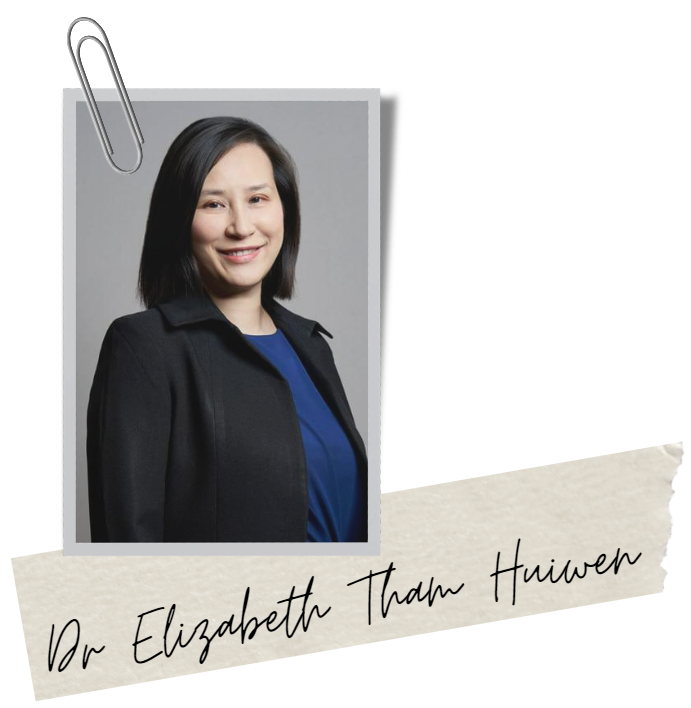
What is your research area?
My research focuses on mechanistic pathways, endophenotypes and allergy prevention approaches for Atopic Dermatitis (AD) and Food Allergy (FA) in the Asian Paediatric population.
What prompted you to be a clinician-scientist (CS)?
As a young clinician, I was struck by the immense psychosocial, emotional and financial burden that severe Atopic Dermatitis (AD) had, not only on infants and children afflicted by this terrible, chronic skin disease, but also their whole family. A significant proportion of children with severe AD also develop other allergic disorders like food allergies, allergic rhinitis and asthma in later life (atopic march) which compounds the burden incurred by this group of disorders. This inspired me to pursue research into ways to prevent and treat severe AD, and thus also food allergy, which are essentially incurable unless the child outgrows it on his/her own as conventional therapy is based around only controlling the symptoms of the disease. Being a clinician-scientist allows me to bring clinical problems to the bench, understand the underlying mechanisms and find creative solutions to bring back to the bedside for clinical translation.
What excites you about your research?
My field of research is exciting because of the vast amounts that are unknown. This uncertainty may be unsettling for some, but I find it both challenging and worthwhile. It is similar to taking a trip through a dark dense forest to come out the other side, but also creating a map along the way. Often, I find wonderful treasures in the forest if I look hard enough.
How do you manage your time to do research in the midst of heavy clinical workload?
As a Clinician-Scientist on the NUS Tenure Track, I am provided 70% protected time to pursue research. I also have very supportive mentors, HOD and division members who support me in each aspect and allow me to grow and flourish in my research. I also have a great research team who are highly skilled, driven and motivated, who run my research independently and efficiently. Because of this, I can be fully productive outside of clinical work.
What are you planning to do after your PhD/Fellowship?
My focus in the near future is on identify endophenotypes of AD and biomarkers of disease, which will set the stage for the development of non-invasive preventive and therapeutic interventions. With the results of this project I will be applying for a Clinician-Scientist Award (CSA) for the next phase of my research.
What is one piece of practical advice you would give to someone new entering this field?
I have so many!
- Look to problems you face in clinical practice as the basis for research ideas, which would then translate to clinically relevant interventions for research.
- Protected time for research is absolutely critical for success in research. As such, having a fully supportive mentor and HOD is paramount.
- Look for seed grants and other funding opportunities which are ring-fenced only for early career researchers, as these will provide you with preliminary data that can be used to support larger grants like an NIG or TA.
- Networking! Actively look for opportunities to meet, or ask to be introduced to, other researchers in your field of interest as they may eventually become your collaborators.
What do you like to do during your free time?
I love reading and watching good movies. I am also a mother of 4 very active children who take up all my free time otherwise! I now spend all my weekends getting sunburnt at East Coast with my older two children at sailing training.
Dr Sia Ching Hui
Associate Consultant, Department of Cardiology, National University Heart Centre, Singapore
Senior Lecturer, Department of Medicine, Yong Loo Lin School of Medicine, National University of Singapore
MBBS(S’pore), MMed(Int Med)(S’pore), MRCP(UK), FAMS(Cardiology)
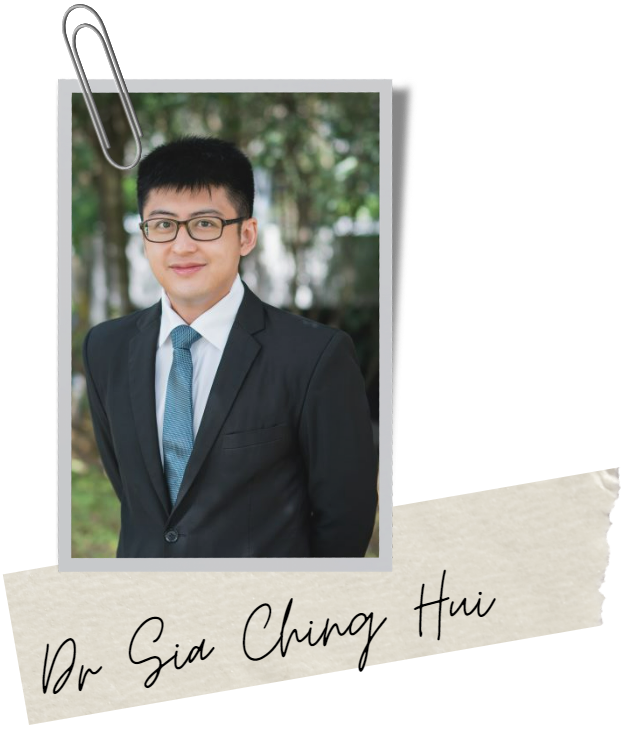
What is your research area?
My research focuses on heart-brain interactions. The heart and brain are important organs in the body that communicate across multiple pathways, but their interaction is not fully understood. Cardiovascular and cerebrovascular diseases are major causes of morbidity and mortality globally, and the ageing population will exacerbate the problem. It is of utmost importance to reduce this twin burden of disease. My second research focus is multimodality cardiac imaging. It involves using different imaging modalities, such as magnetic resonance imaging and echocardiography, to diagnose, predict, guide treatment, and assess response.
What prompted you to be a clinician-scientist (CS)?
While training, I realized that as I acquired more knowledge, I knew less and less overall. There have been a great deal of studies and guidelines published to date, especially in a field such as cardiology, but I still find that there are often no answers to clinical situations we face on a daily basis. Telling patients there is no particular treatment or cause for something, and then going on as if this were fine, is not satisfying. While patients accept that doctors cannot know everything, I find it very fulfilling to be able to contribute to finding those answers rather than waiting for them to be discovered. By being a researcher, I am able to bridge that much-needed gap to find solutions to the problems we face every day.
What excites you about your research?
My field of research is exciting because of the vast amounts that are unknown. This uncertainty may be unsettling for some, but I find it both challenging and worthwhile. It is similar to taking a trip through a dark dense forest to come out the other side, but also creating a map along the way. Often, I find wonderful treasures in the forest if I look hard enough.
Could you describe one of your typical workdays? What are some of the challenges of being a CS? How do you work to overcome that?
As cliché as it may sound, I don’t have a typical workday. It’s one of the interesting things about being a doctor! Patients may ask questions in clinic that one has never considered, or a scan may reveal something I hadn’t anticipated. Doing research amidst clinical work requires filtering out distractions and focusing on answering the questions that need to be answered. Also, it’s essential to take care of yourself, such as striving to get the right food, more sleep and exercising each day. Working in a team also makes the journey more fun.
What is the superpower (skills and techniques) you are most pleased with? What new superpowers would you like to develop?
It would be great if I had superpowers so that I could accomplish more in a day! Nevertheless, I have acquired some skills along the way. My formal research training has been with a Master of Clinical Investigation, however I have also taken the time to complete an Executive Master of Business Administration in order to better understand the dynamics of developing a successful and forward-looking research team.
What would you do differently if you could go back in time, and why?
I would have started learning about research and getting my hands dirty much earlier. There was so much I was missing out on!
If you were not in this career, what else would you have done?
The same thing, ironically! After junior college, I was offered a scholarship to pursue a BSc-PhD, but I decided to pursue a professional degree instead by doing medicine. I never imagined that many years later I would be back doing research.
Dr David Chen Ziyou
Associate Consultant, Department of Ophthamology, National University Hospital
Associate Consultant, Healthy Ageing Programme (Age Better), Alexandra Hospital
MBBS (S’pore), MMed (Ophth), ,FRCOphth, FAMS
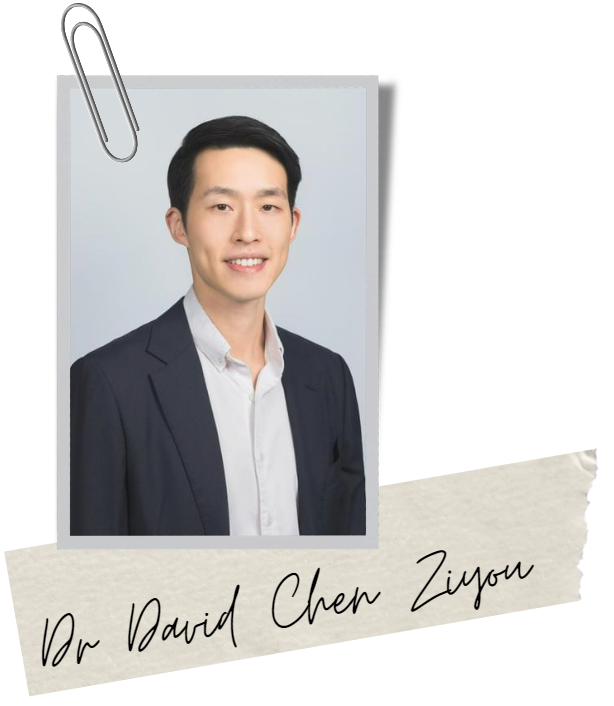
What is your research area?
My area of research is innovation in Ophthalmology, with a special focus on anterior segment surgeries (cataract / refractive / glaucoma surgeries).
What inspired you to choose your specialty area?
I have always been interested in vision and I’m a strong proponent of sight being the most important of our senses! That aside, I witnessed firsthand the life-changing impact of eye surgeries during a volunteer trip to Ghana where the same patient that could not see just a day before regained functional vision after an elegant cataract surgery done in 10 minutes. The icing on the cake was that this specialty has cutting edge technology and we are always among the first to utilize the latest tools and gadgets.
What are your current superpowers (skills and techniques)?
I do not have any research-specific skills, but I am relatively tech-savvy and open to learning new things. I am self-taught in R statistics, basic Python, git and command line programming through a mixture of trial and error as well as online open access tutorials. I consider myself a relatively fast learner and digital native.
In accordance to the above, I am organized and I try to make use of technology and automation to keep tabs on my various progress on different projects and initiatives that I am on to maximize efficiency. I do my best to keep my discipline in ensuring my milestones are kept in check.
If you were not in this career, what else would you have done?
I would most likely be working in a tech-related field and hopping on the Web3 bandwagon.
Which 3 guests (dead or alive) would you invite for dinner, and why?
Keeping to the theme of tech:
1) Leonardo da Vinci: the quinessential polymath whose interests and contributions span both the arts and sciences.
2) Linus Torvalds: creator of the Linux operating system which sparked the open source revolution.
3) Satoshi Nakamoto: creator of the bitcoin which catapulted blockchain to the mainstream. It would be cool to know how he actually looks like in person
If Satoshi remains anonymous and elusive, then I would replace him with Alan Turing, whose cryptography work was instrumental for the success of the Allied forces in World War II and also the invention of the modern computer.
Dr Cinnie Yentia Soekojo
Associate Consultant, Division of Haematology, Department of Haematology-Oncology, National University Cancer Institute, Singapore
MD, MRCP (UK), FRCPath (UK)
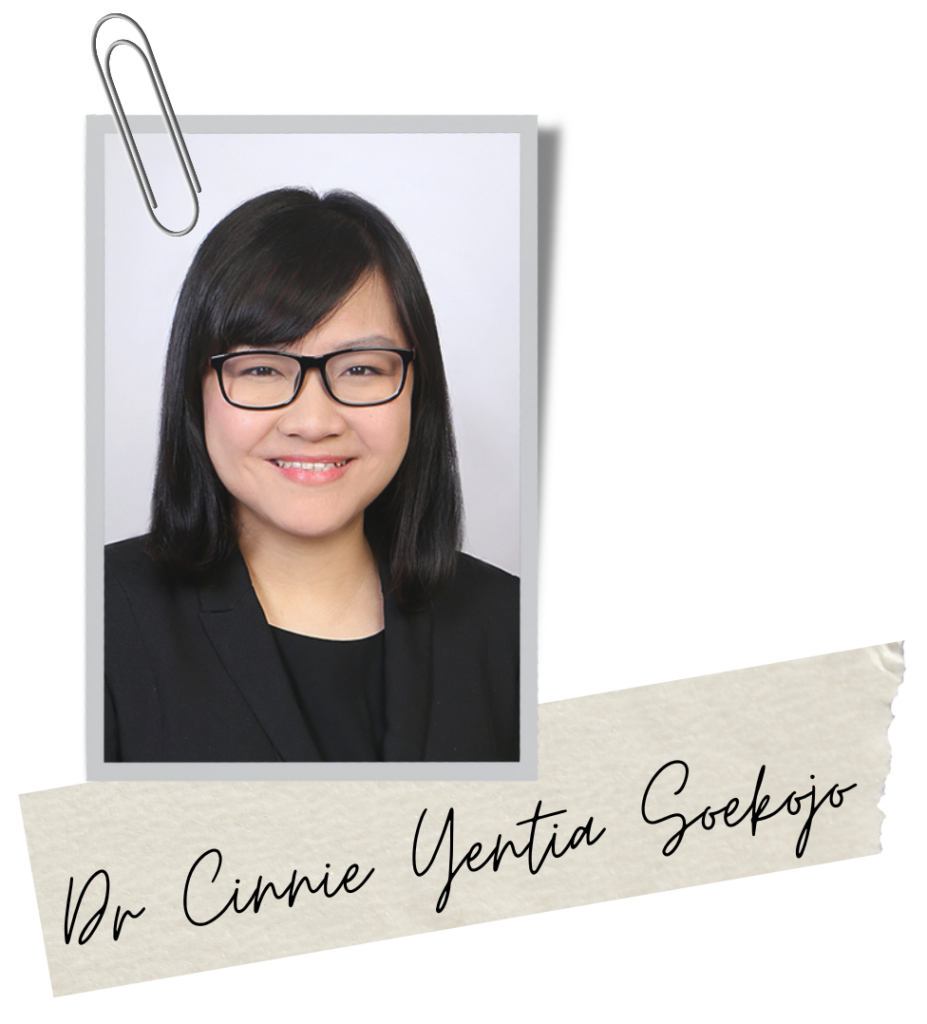
How did you get into your research area? Was there a defining moment?
I have always been fascinated with the deep understanding of disease biology and precision medicine. The reason that draws me into Haematology, especially Haemato-Oncology, is the incorporation of genetic understanding in patient management. I believe that patients with same cancer can have different diseases which require different treatments, because there is heterogeneity in disease biology, in terms of genetics and tumor microenvironment. It is important to understand this at a deeper level. My research focuses on understanding this disease biology at a high resolution by using single-cell sequencing and spatial omics.
Where did / are you completing your fellowship?
I am currently doing my fellowship at the Dana-Farber Cancer Institute and Broad Institute of MIT and Harvard, and I am affiliated with Harvard Medical School.
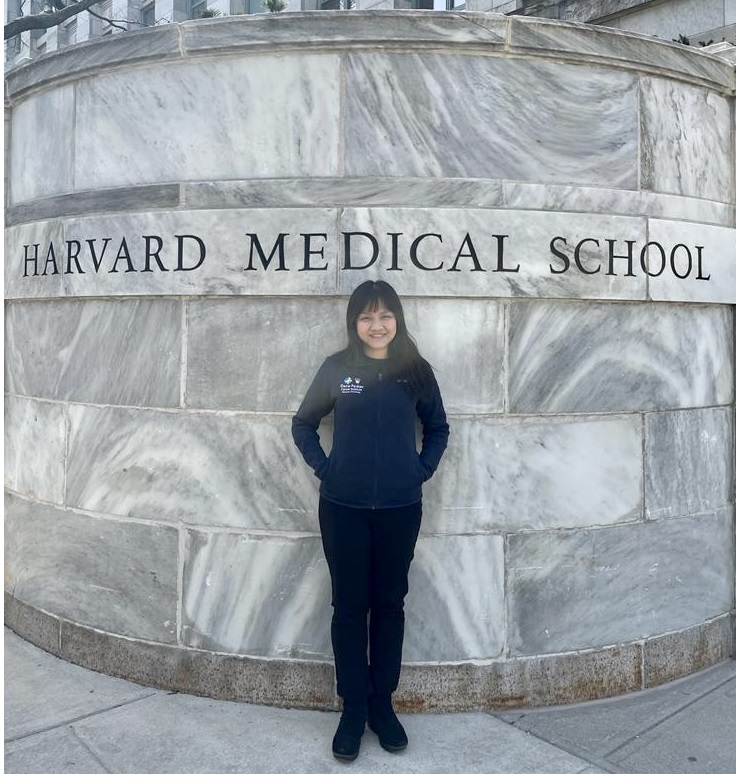
What are your current superpowers (skills and techniques)?
Being a physician specializing in multiple myeloma, hence knowing the clinical context and gaps, bringing it to the lab with expertise in single-cell sequencing and spatial omics, and then bringing it back again to the patients for precision and personalized medicine.
What new superpowers (skills and techniques) and areas would you like to develop?
I feel the best part of my career so far is having wonderful mentors guiding me along this arduous path for which I am so grateful, and I hope to pay this forward. I hope to be able to understand other people’s needs and help them grow.
If you are not in this career, what else would you have done?
Perhaps a musician. When I was a teenager, I played in bands as a pianist and composed some original songs. Those are beautiful memories and I do enjoy that.
Which 3 guests (dead or alive) would you invite for dinner, and why?
Both my paternal and maternal grandfathers who passed away when I was relatively young, so I didn’t have much chance to talk to them and know them well.
My paternal grandfather came from China to Singapore and then to Indonesia when he was very young. Despite his lack of education, he was a very wise person with good business acumen. Until now, my father will still sometimes quote what he said when giving us life advice.
My maternal grandfather received a good education in China with a keen interest in literature. Recently, my mother found some of his original poems which he wrote decades ago even before I was born. Those are very precious.
Mr. Lee Kuan Yew – Whenever I walk around Singapore, I am always so amazed at how he could transform Singapore into how it is today in just a few decades.

